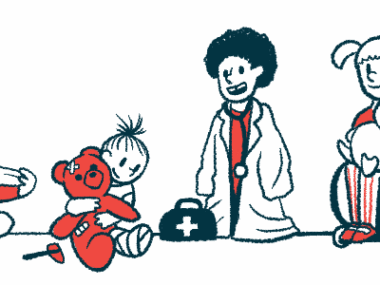How our son’s Prader-Willi meltdowns affected family life
We tried everything we could to adjust his behavior. Today, there's change.
Written by |

While I was shopping with my grandson, he spotted a ball in the next aisle. Since we’d experienced incidents of balls thrown at other shoppers, I didn’t want a repeat. “No ball!” I said.
That provoked a tantrum. Throwing himself on the floor, my grandson began to scream and cry. It transported me back to the intense meltdowns that my son, Robert, who has Prader-Willi syndrome (PWS), exhibited.
Shoppers paid little attention as they passed by my screaming grandson. They may have been thinking of their own toddlers, or similar experiences with children unable to control their emotions. After 10 minutes, he collected himself and we went on our way. I was grateful that this tantrum was fairly normal.
Tantrum duration is the difference between a toddler tantrum and the meltdowns that people with PWS have. “Outbursts” or “behaviors,” as medical literature and members of the PWS community might call these meltdowns, can begin around age 5. They can last an hour or more and often recycle later if a memory is triggered.
My son’s tantrums
My first memory of a lengthy behavior happened at the Gillette Children’s Hospital clinic for PWS, where we had blood tests for Robert’s diagnosis. Five or six units of blood would be extracted. Needles terrified my son, and he knew what happened in the lab: needles!
As we took the elevator to the lab, Robert stated, “I think we should reschedule.” He continued to repeat it in louder voices until he was screaming. I’d never experienced anything like this outburst with a child. He was totally out of control and needed to be restrained for blood to be drawn.
The test came back positive for Prader-Willi syndrome. Our worst fear had come true. How would we cope in the years to come?
Thankfully, our son’s outbursts were never violent; he never hit. Instead, he’d cry and scream if things didn’t happen the way he wanted. Often, we sent him to his room, and he complied. There he’d continue to vent until he went to sleep. (Daytime sleepiness is common in people with the syndrome.)
If you’re not familiar with the syndrome or have never experienced behavior of this sort, it may seem cruel to send someone so upset to his room. We’d first try distraction, then some form of consequence. Our Cavalier King Charles spaniel would lick his tears away, hoping to calm him. Nothing helped until Robert decided it was over.
At age 10, Robert balked at taking a shower. Nothing would change his mind, and he was too big for me to physically manipulate. I threatened the loss of every privilege — his Gameboy, TV time, toys — but nothing worked. Or so it seemed. After 45 minutes of screaming, he said, “I’ll go in the shower if you take my punishment away.” I was exhausted and gave in.
Our therapist asked Robert what it felt like during the tantrums. He suggested it felt like being in a tornado. We experimented with medications, but they seemed to make tantrums last longer so we discontinued them. Additional treatment options are now available.
As parents, we found his behaviors difficult to manage. Sharing food was a common trigger, and it affected his sibling and cousins. We tried to be consistent with our children. We often heard, “Why doesn’t Robert have to share?”
I wanted to say, “Because I’m exhausted and don’t want another fight, that’s why!”
Progress, finally
Our coping mechanisms may seem outdated. The group home where my son now lives has a totally different program. Meals and snacks are served at the same time each day. Exercise and appropriate behavior are rewarded with food.
We’d thought food rewards would place too much emphasis on eating; after all, normal dieters are encouraged not to reward themselves with food and to choose, perhaps, new clothes in a smaller size. But PWS is far from normal. Wrapping our heads around his new program was quite a challenge.
Robert and I always enjoyed Caribou Coffee together. I couldn’t understand why this small treat would undermine house rules, but as his case manager explained, “He needs to work for his rewards.”
The weight Robert had gained as a teen began to melt off. He lost 100 pounds in the first year he lived at the group home.
Behaviors, however, were harder to vanquish. It was tough for our son to adjust to a new environment with multiple restrictions. It took him several years to consistently achieve the program’s food rewards. He now gets food shopping and movie rewards on a regular basis.
Now 15 years have passed, and his behaviors are rare. Several factors contribute to that, but I believe the daily routine of meals and snacks served at the same time each day helps to eliminate his anxiety.
Now I’m no longer the bad guy meting out punishments for behaviors. We’re grateful to now have a happy, engaging, humorous son, minus the meltdowns.
Note: Prader-Willi Syndrome News is strictly a news and information website about the disease. It does not provide medical advice, diagnosis, or treatment. This content is not intended to be a substitute for professional medical advice, diagnosis, or treatment. Always seek the advice of your physician or other qualified health provider with any questions you may have regarding a medical condition. Never disregard professional medical advice or delay in seeking it because of something you have read on this website. The opinions expressed in this column are not those of Prader-Willi Syndrome News or its parent company, Bionews, and are intended to spark discussion about issues pertaining to Prader-Willi syndrome.






Patricia McCormick
Our daughter is 22 years of age and was recently diagnosed with bipolar disorder that often forms after or later in life of a person with Prater Willie syndrome, which she has as well. We are currently being treated by a psychiatrist using Carol or Tegretol that helps with depression, anxiety, and bipolar disorders. She takes 300 mg three times a day and it is controlling her outburst no longer having emotional or behavioral issues as we once were as you mentioned in your email. We would go shopping with her and if she didn’t get what she wanted, she would Have an outburst as such maybe this will help you good luck God bless you and your family